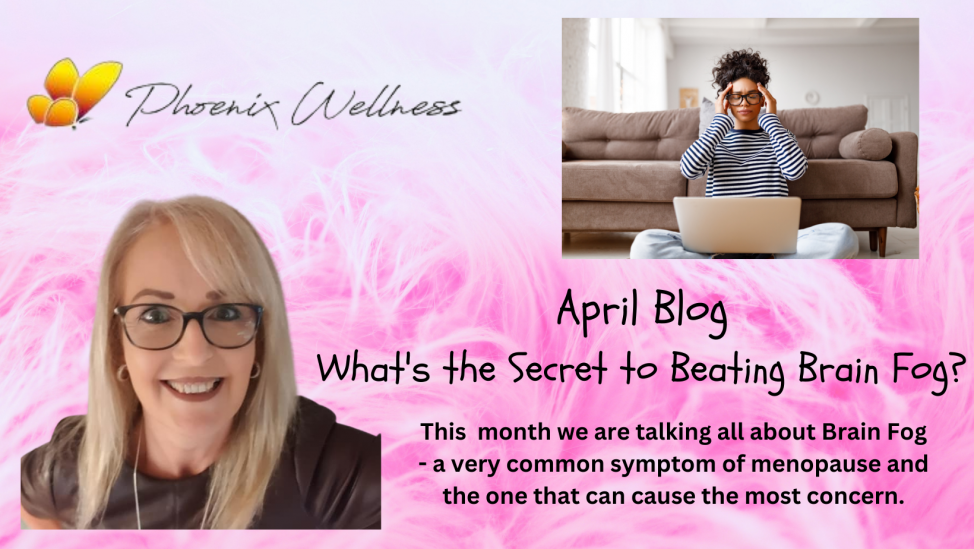
Welcome to April’s blog. I thought I’d take a look at how to beat brain fog as many of you have told me it is the one symptom with peri- and menopause that has completely floored you. It’s like you wake up one morning and whole bits of your brain doesn’t seem to work like it used to and you don’t know why. I completely get this as I was there too, and it feels alarming – I thought I was going crazy. I had no clue what was happening, and I never thought it was due to perimenopause because I didn’t know enough about it.
Ladies, brain fog doesn’t mean you’re crazy or worse still, that you’ve developed early dementia; it’s simply a symptom of perimenopause. Over 70% of women going through menopause suffer with brain fog.
What is brain fog?
Brain fog isn’t a clinical diagnosis – it’s like irritable bowel syndrome. It describes a collection of experiences that occur together, making you feel like you’ve lost clarity and focus. Some of the most common symptoms include:
- Anxiety,
- Depression,
- Memory loss,
- Insomnia or disrupted sleep,
- Lack of concentration,
- Low motivation or low energy,
- Irritability or mood swings,
- Forgetfulness,
- Loss of clarity or focus,
- Lower decision-making capacity, and less able to solve problems.
Can you see how those feelings of “woolly thinking” can set in? Plus, many of these symptoms show up during menopause – irritability, mood swings, low energy etc.
But why does this happen?
There are several reasons but the big one is hormone imbalance, which makes sense that most women complain about brain fog when they experience big hormonal changes i.e., pregnancy, post-partum, or menopause. At these points in our lives our hormones are raging and that causes brain fog.
There are other times too when we can be more susceptible to brain fog including when we are battling long term health conditions such as lupus, chronic fatigue (ME) and MS, or if we are undergoing cancer treatment or taking other medication. All these conditions can bring on brain fog and of course, are not exclusive to women so we need to remember that brain fog can impact the men in our lives too. But by far the biggest cause of brain fog is a hormone imbalance.
Alongside the medical causes of brain fog we cannot overlook the impact of our lifestyles; poor diet, dehydration, lack of sleep, too much time working on computers without a break, stress, toxins, pollutants and substance abuse.
Why do we suffer brain fog through peri- and menopause?

It’s all about our changing hormones and in particular oestrogen and testosterone. Both of these play a major role in our brain health, cognition and memory function.
Oestrogen stimulates our brain, keeping the neurons firing and supports the growth of new cells helping to build new connections. The drop in oestrogen results in a reduction in brain energy as it is critical in helping our brain cells to burn more glucose which is needed for energy. Less brain energy can trigger hot flushes, night sweats, anxiety, depression and of course brain fog.
Testosterone strengthens the nerves in our brains, helping with mental sharpness and clarity as well as giving us energy and motivation. Testosterone is important in strengthening the arteries that supply blood flow to our brain which is crucial in protecting against memory loss.
I think we can start to see why women are at great risk than men of developing brain illnesses like Parkinson’s, MS, and Alzheimer’s!
What is the secret to beating brain fog?
There are two things you can do right now that will help – make some small lifestyle changes and if you are experiencing peri- or menopause, think about talking to your GP or menopause nurse about HRT. Here are a few tips you can try to beat brain fog:
Look at supplements – there are many available over the counter that you could try that help minimise mood swings, anxiety and brain fog such as Ashwagandha.
Think about your diet – we all know the importance of a healthy balanced diet to help our bodies to function better, but are we getting enough of the right vitamins and minerals to support better brain function? Start adding food to your diet that is high in vitamins A, C, D and E in particular, plus Omega 3, magnesium and zinc. All these vitamins and minerals help to combat the impact of free radicals which are formed as our brain metabolises glucose. Too many free radicals can impact the functioning of our bodies and minds.
Stay hydrated – our brain is 73% water. When we don’t drink enough (1-2 litres of water daily) we become dehydrated. Our brains are less able to function well – we struggle to make decisions, we can’t concentrate, and it takes us longer to work through problems.
Make small changes to your lifestyle – this means building good habits to combat the triggers of brain fog:
- Take regular breaks from your computer and turn off devices at least an hour before bed.
- Learn to relax by taking up yoga, meditation, or mindfulness to help you reduce stress levels.
- Get a good night’s sleep which means going to bed and getting up at the same time every day, and aiming for 7-8 hours sleep per night so your brain can cleanse itself.
- Get more exercise daily which helps to alleviate stress, gets your body working and functioning better, gives you energy and positive feelings to combat low energy and makes you feel tired so aiding good sleep.
- Learn a new skill which is one of the quickest ways to give your brain a workout, encouraging it to grow new connections which are vital to keeping it healthy.
- Take time out to do what makes you happiest because when we are happy we experience positive emotions which help relieve stress, build self-esteem and help avoid anxiety and brain fog.
Brain fog in a nutshell
Very simply brain fog occurs due to hormonal imbalances which often occur through peri- and menopause.
Taking HRT and making small lifestyle changes can help us to overcome it quicker and protect our brain health for longer.
For more help
If you’d like more help with peri- and menopause, check out our other blogs and resources or email me for a connection call so that we can work out how we may be able to help.

